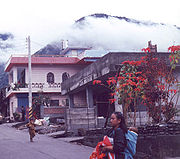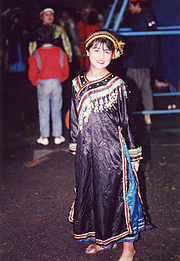
Bunun People
Encyclopedia

Bunun language
The Bunun language is spoken by the Bunun people of Taiwan. It is one of the Formosan languages, a geographic group of Austronesian languages, and is subdivided in five dialects: Isbukun, Takbunuaz, Takivatan, Takibaka and Takituduh. Isbukun, the dominant dialect, is mainly spoken in the south of...
. Unlike other aboriginal tribes in Taiwan
Taiwan
Taiwan , also known, especially in the past, as Formosa , is the largest island of the same-named island group of East Asia in the western Pacific Ocean and located off the southeastern coast of mainland China. The island forms over 99% of the current territory of the Republic of China following...
, the Bunun are widely dispersed across the island. In the year 2000 the Bunun numbered 41,038. This was approximately 10% of Taiwan's total indigenous population, making them the fourth-largest tribal group. They have five distinct sub-tribes: the Takbunuaz, the Takituduh, the Takibaka, the Takivatan, and the Isbukun.
History
Until the coming of the Christian missionaries in the beginning of the 20th century, the Bunun were known to be fierce warriors and headhunters. The Bunun were one of the "high-mountain tribes" (along with the Atayal and the TarokoTruku people
The Truku people are an Indigenous Taiwanese tribe. Taroko is also the name of the area of Taiwan where the Truku tribe resides. The Executive Yuan, Republic of China has officially recognized the Truku since January 15, 2004. The Truku are the 12th aboriginal tribe in Taiwan to receive this...
) who traditionally lived in small family units in Taiwan's Central Mountain Range and were hostile to all outsiders, whether they be Chinese immigrants or surrounding aboriginal tribes. Whereas most other aborigines were quite sedentary and tended to live in lower areas, the Bunun, along with the Atayal and Taroko were constantly on the move in Taiwan's Central Mountain Range, looking for new hunting grounds and practicing slash-and-burn agriculture. Their staple foods were millet, yam, and game.
During the Japanese rule
Taiwan under Japanese rule
Between 1895 and 1945, Taiwan was a dependency of the Empire of Japan. The expansion into Taiwan was a part of Imperial Japan's general policy of southward expansion during the late 19th century....
(1895–1945), the Bunun were among the last tribes to be "pacified" by the Japanese government in residence. After an initial period of fierce resistance, they were forced to move down from the mountains and concentrated into a number of lowland villages that were spread across the Island. As a result, the family unit became less important and life centred around individual village units. The Japanese government restricted hunting practices (mainly to control the use of firearms) and introduced wet rice cultivation. Many Bunun were recruited as local policemen and during WWII, the Japanese army had Bunun regiments.
Throughout the 20th century, several waves of missionaries
Missionary
A missionary is a member of a religious group sent into an area to do evangelism or ministries of service, such as education, literacy, social justice, health care and economic development. The word "mission" originates from 1598 when the Jesuits sent members abroad, derived from the Latin...
of various denominations spread across Taiwan. They were particularly successful with the aboriginal inhabitants of the island and after the last missionary wave in the 1940s, that originated in Japan, a majority of aborigines were converted to Christianity. Today, most Bunun either belong to the Catholic Church
Catholicism
Catholicism is a broad term for the body of the Catholic faith, its theologies and doctrines, its liturgical, ethical, spiritual, and behavioral characteristics, as well as a religious people as a whole....
or to the local Presbyterian Church
Presbyterianism
Presbyterianism refers to a number of Christian churches adhering to the Calvinist theological tradition within Protestantism, which are organized according to a characteristic Presbyterian polity. Presbyterian theology typically emphasizes the sovereignty of God, the authority of the Scriptures,...
.
After the arrival of the Chinese Nationalist Kuomintang
Kuomintang
The Kuomintang of China , sometimes romanized as Guomindang via the Pinyin transcription system or GMD for short, and translated as the Chinese Nationalist Party is a founding and ruling political party of the Republic of China . Its guiding ideology is the Three Principles of the People, espoused...
in October 1945, difficult days began for the aboriginal population. The "one language, one culture" policy of the Nationalist government prohibited to use of any language other than Mandarin Chinese
Standard Mandarin
Standard Chinese or Modern Standard Chinese, also known as Mandarin or Putonghua, is the official language of the People's Republic of China and Republic of China , and is one of the four official languages of Singapore....
, for official use as well as in daily life, and indigenous cultures were systematically discriminated against and encouraged to assimilate into mainstream culture. Bunun culture was eroded by the joint pressure of their new faith as well as the government's sinification policies. The situation improved only recently, when after two decades of democratic reforms.
Culture

A variant of the story tells that long, long ago, a mother and father went out working in the field and took their newly born son with them. While working, they put the child in a basket at the side of the field, and for a whole day he lay in the unbearable heat of the two suns. When the parents returned in the late afternoon, they found that their son had completely dried up and turned into a black lizard. Stricken by grief, the father took his bow and shot down one of the suns.
This story illustrates the importance of the sky in traditional Bunun animist religion
Animism
Animism refers to the belief that non-human entities are spiritual beings, or at least embody some kind of life-principle....
. The Bunun assumed that the world in which they lived were full of supernatural beings (qanitu) that were often associated with particular places (trees, rocks, etc.). An important locus of supernatural power was the sky (dihanin/diqanin). All supernatural forces seem to have had a fairly abstract character and it is therefore not really clear whether the sky was a god or just a place in which all kinds of spirits lived.
It is certain, however, that the moon was considered to be one of the major spirits, and almost all activities in daily life had to be aligned with the lunar calendar
Lunar calendar
A lunar calendar is a calendar that is based on cycles of the lunar phase. A common purely lunar calendar is the Islamic calendar or Hijri calendar. A feature of the Islamic calendar is that a year is always 12 months, so the months are not linked with the seasons and drift each solar year by 11 to...
. This could go very far, for instance, in a certain lunar month it was forbidden for women to wash themselves. The Bunun are the only aboriginal tribe in Taiwan that developed a primitive form of writing to record lunar cycles and their relationship to important events such as the harvest or the slaughter of pigs.
The prescriptions related to the lunar calendar are part of a larger system of prescriptions and taboo
Taboo
A taboo is a strong social prohibition relating to any area of human activity or social custom that is sacred and or forbidden based on moral judgment, religious beliefs and or scientific consensus. Breaking the taboo is usually considered objectionable or abhorrent by society...
s that used to govern all aspects of Bunun life. Many of these had a ritualistic character and all were part of an age-based pecking order where an absolute obedience to one's elders was demanded. For instance, in order to determine whether a man could go hunting, he had to wait till one of the elders had had a prophetic dream (matibahi). If the dream was good, he could go out hunting. A bad dream indicated that great mishap would befall the hunter if he would go in the woods, and the elders would forbid him to go. Most of these rules got into disuse after the coming of Christianity (which branded them as superstition), but present-day Bunun society has still retained a number of social rituals and still imposes a strong obligation on children to behave in a respectful and obedient way towards anyone that is older than themselves.
The Pasibutbut is a song of Bunun Sowing Festival, sung polyphonically in four-part harmony (Common 8 heterophonic voice, usually 5-12 heterophonic voices). The Taiwan composer Jin Fong YANG 楊金峯 analyzed the structure of this song. Japanese Musicologist 黑澤隆朝 recorded with Bunun musicians in 1943.
Ear-shooting festival
The ear-shooting festival is a male rite of passage ceremony in Bunun culture. The festival is usually held between March and April, and women are traditionally barred from attending. Before the festival, every adult male would journey to the mountains to hunt. Following a successful hunt, the men would return home and hang the carcasses from wooden frames so that the boys could shoot the dead animals. Those who could shoot a deer's ear were considered especially talented due to its small size. After this ritual, the participating boys were considered adults and could from then on join their brothers and fathers in the hunt.With modern lifestyle changes in Bunun society, the ear-shooting festival has become more of a ritualized performance; though the marksmanship and hunting skills taught through the festival are no longer as relevant, the event is still considered beneficial as it teaches respect for elders and the community at large.

